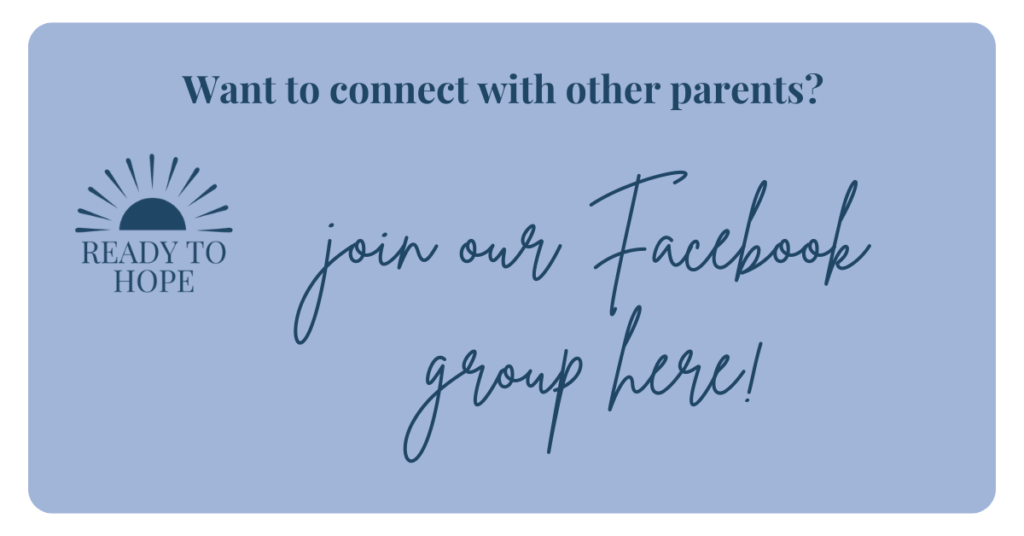Why Don’t Men Talk About Mental Health?
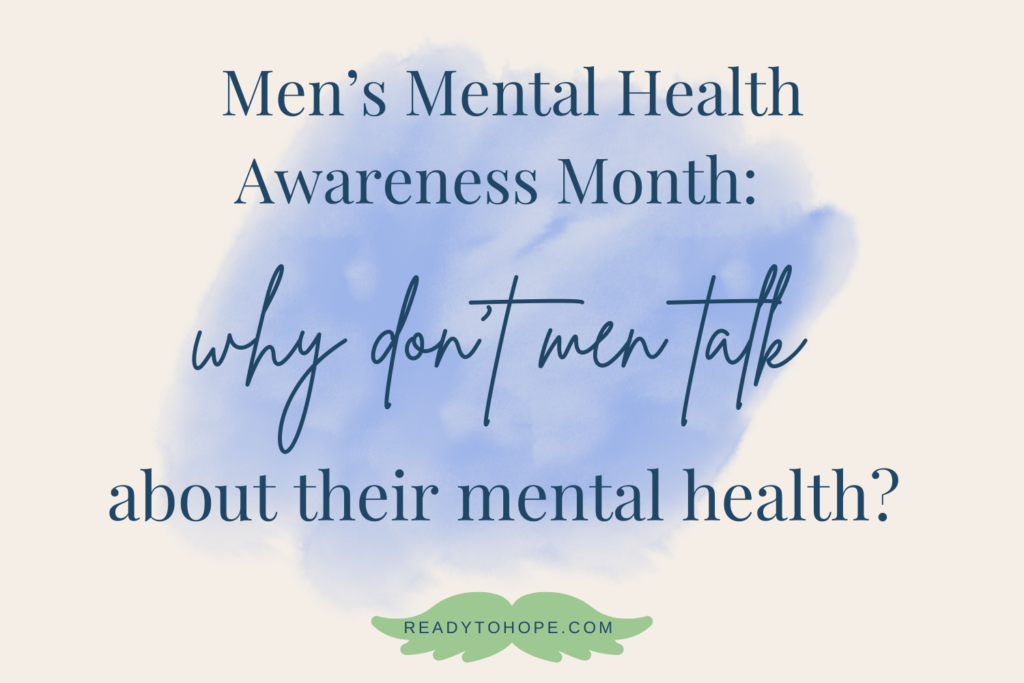
Why don’t men talk about their mental health?
We are continuing our discussion about men’s mental health, and as we do so, we want to just remind you of a couple of things:
First, when we say “men’s” we are referring to men and young men and honestly, in many cases these truths hold even for boys! The social and emotional expectations we put on young people begin at an early age, so in many cases even younger boys have the same struggles with expressing their emotions that older teens and adult men do!
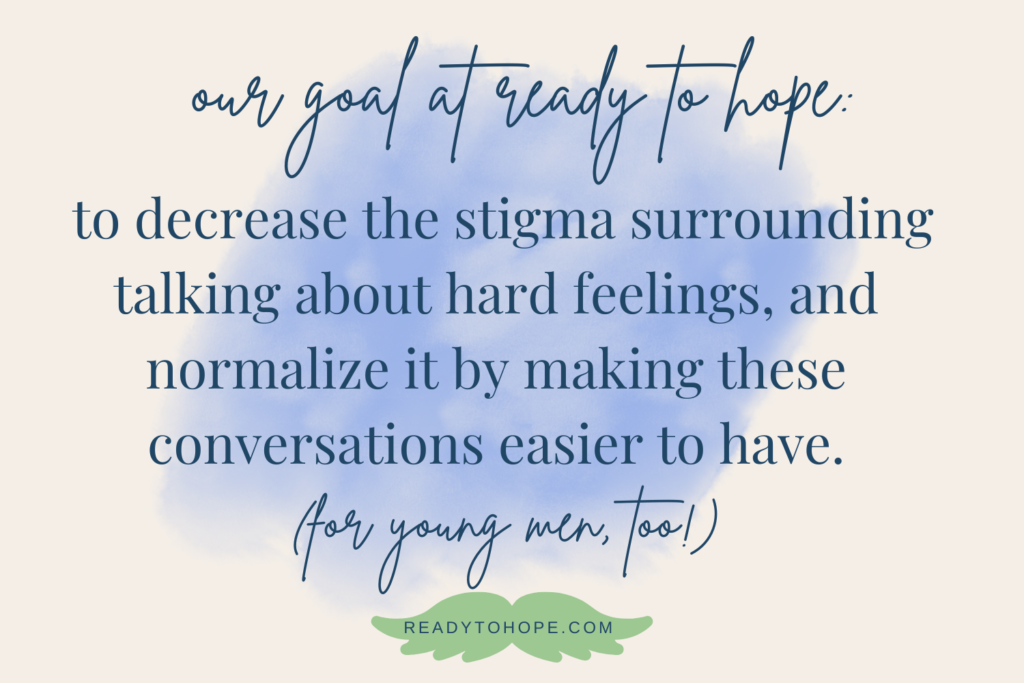
Secondly, and as a follow up to point number one: if any of this discussion applies to you, we want you to understand:
It is not your fault.
If you have trouble expressing your feelings, it’s not your fault.
If you are struggling with anxiety or depression or suicidal thoughts, it’s not your fault.
This life can be hard, and that’s why Ready to Hope exists!
But more than anything we want you to be kind to yourself, and know that there are resources available.
Our goal at Ready to Hope is to decrease the stigma surrounding talking about hard feelings, and normalize it by making these conversations easier to have.
Everyone is struggling with something. So if you are, just know you’re not alone and there is a way through.
Okay, now let’s dive in.
Why don’t men (and young men, and even sometimes boys) not talk about their feelings and their mental health?
Societal Expectations of Masculinity
Traditional ideas around masculinity often emphasize traits like strength, self-reliance, and emotional control.
Often from an early age, boys and young men are socialized to believe that expressing vulnerability, sadness, or fear is a sign of weakness.
This “man up” mentality can make it difficult for men to even acknowledge their emotional struggles, let alone share them with others!
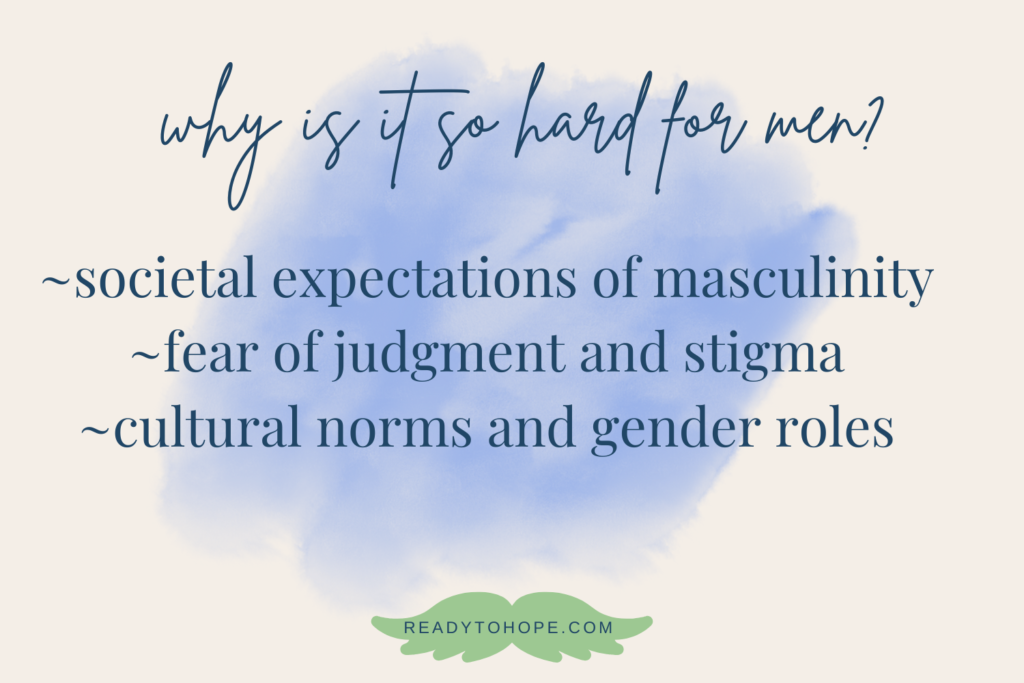
Fear of Judgment and Stigma
The truth is: seeing a therapist or seeking help is only just beginning to become acceptable, and only in some circles. It hasn’t been that long ago that having a history of going to therapy could even hurt your ability to get certain positions, especially in the military!
The stigma surrounding mental health and vulnerability is often stronger for men, as they might worry that sharing their feelings will make them appear weak, less capable, or even unmanly.
Many men are concerned that talking about their emotional pain will lead to negative perceptions from others, which often means they just keep quiet and suffer alone.
Cultural Norms and Gender Roles
Men are often expected to be providers and protectors. They are the ones expected to be the stable and strong support for others. As a result, they may deny or ignore their own emotional struggles, in order to maintain an image of control.
Even young men can have a vision of what they want their future to be as a provider, and therefore believe that they need to adopt early on an attitude of “put your head down and get it done” at all costs, and especially the cost of their emotional well being.
Lack of Emotional Education
Many men grow up without being taught how to identify and express their emotions in healthy ways. In some families or cultures, boys are discouraged from crying or showing sadness, which can mean that they end up learning instead how to stuff down those feelings. As a result, they can often become disconnected from their feelings, which of course makes it so much harder to name them or even recognize them.
If men and boys are not equipped with the language or skills to express their emotions, they may default to anger, frustration, or silence, even when they are experiencing truly challenging feelings like sadness or isolation or anxiety.
Perceived Burden on Others
Along with the pressures to be a provider and a protector, many men feel that they don’t want to burden others- especially those loved ones they feel they must protect and provide for!
Men and young men often feel they must handle their own issues on their own, without help- which is challenging for all of us but especially those who haven’t even been given the language to talk about their feelings!
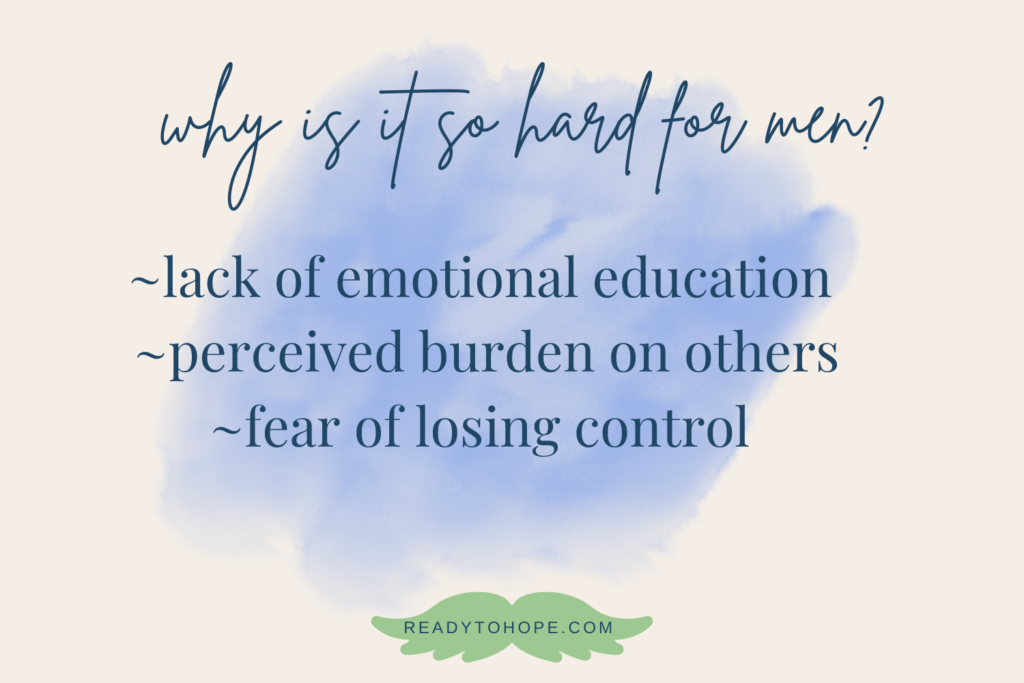
Fear of Losing Control
Vulnerability is hard for most of us, male or female! There is a big fear that when you share your difficult emotions others will judge you or that worse yet, you might break down and cry. This is a feeling most of us face, but as pointed out here, men especially feel the pressure to stay in control. Letting down the walls can feel like a first step to breaking down and losing all control.
“Acting Out” Rather Than “Acting In”
Men often use anger and aggression to mask or hide their challenging emotions. Rather than expressing sadness or stress, they act out by yelling, hitting, or blowing off steam in other ways that may or may not be healthy outlets.
And finally:
Lack of Supportive Networks
Women and men approach and form friendships and even simple social networks quite differently. Women tend to talk more about family and feelings, whereas men often keep the conversations much more surface-level, focusing on sports or gaming, for example.
Additionally, the way that men and women socialize is often different. Women tend to make socializing about conversation and connection and sharing stories and experiences, while men often engage in shared activities such as participating in sports or viewing sports together.
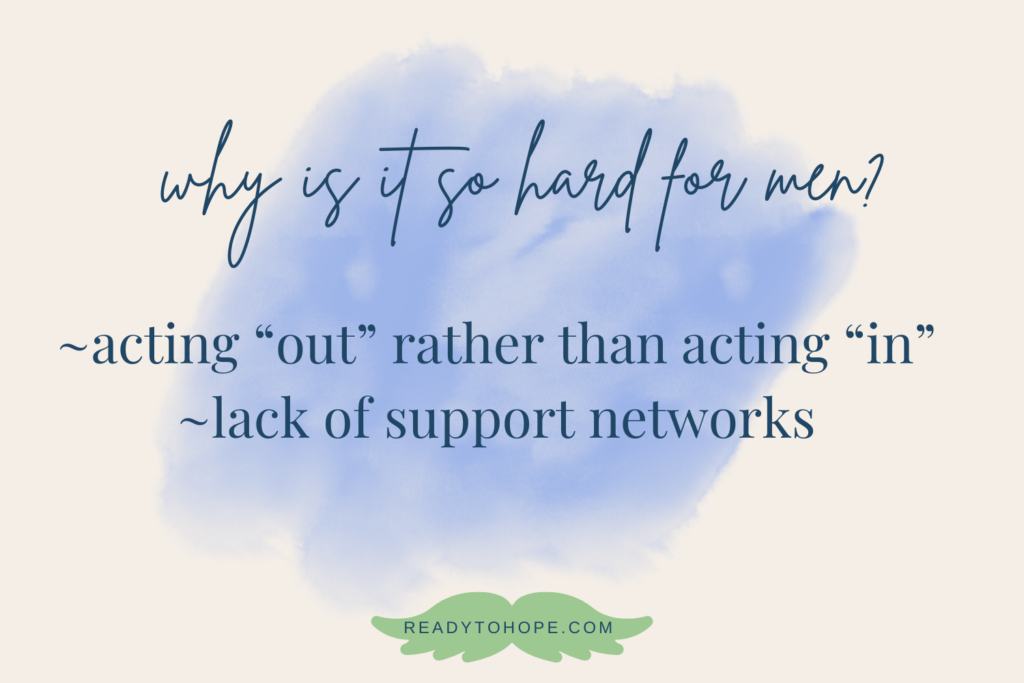
As a result, women naturally form supportive social networks and build emotional intimacy quicker and more often than men do.
Men may have many surface-level friends, but still have no one in their social network that they can lean on when the need comes up.
Conclusion: are you seeing why men and young men are often struggling in silence?!
Once again, we want to point out: it can be hard to be human!
This life isn’t easy for any of us, but men and young men are at such a disadvantage when it comes to their mental health.
Whether it is a temporary, situational struggle that happens at a specific chapter in a young man’s life, or whether he has underlying longer term issues like a general predisposition to anxiety or depression: it is hard for young men to seek and get the help they need!
Our goal this month is to shine a spotlight on these issues, and also to be sure that we communicate that we are here for young women and young men alike!
We want to help decrease the stigma. We want to encourage open and honest conversations about the challenges we are all facing.
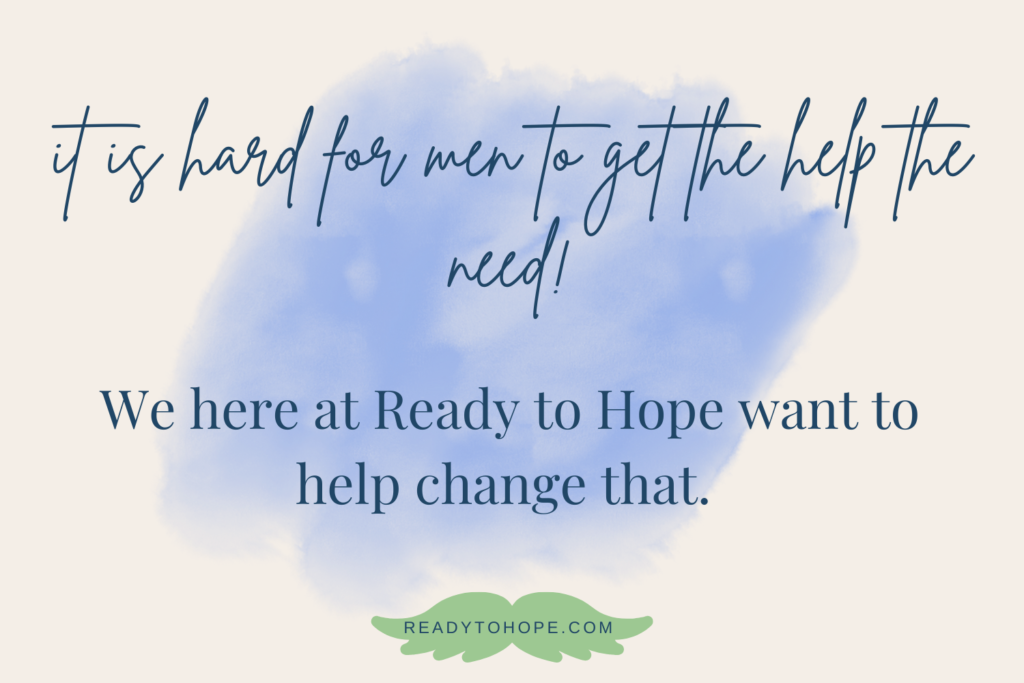
Everyone is dealing with something- so it’s time to stop pretending we’re all fine and help us all share our stories and connect and get support!
How we help:
Join our email list to get updates on our offerings and find out when our next workshops are!
Follow along on social.

And finally, for parents: check out our parents group for conversations and connections and resources!



